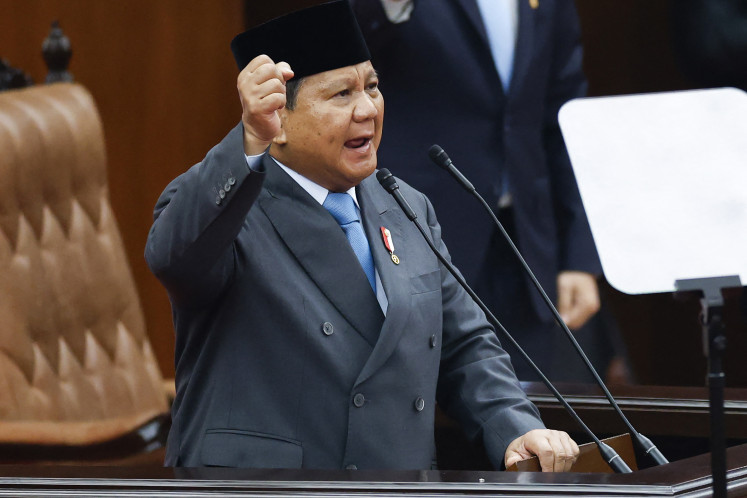Popular Reads
Top Results
Can't find what you're looking for?
View all search resultsPopular Reads
Top Results
Can't find what you're looking for?
View all search resultsData, smartphone boom lifts Telkom’s net profits in Q1
PT Telekomunikasi Indonesia (TLKM), the nation’s largest telephone company, has booked its highest quarterly net profits in six years, as the rapidly growing, young middle class demands greater data usage for smart phones
Change text size
Gift Premium Articles
to Anyone
P
T Telekomunikasi Indonesia (TLKM), the nation’s largest telephone company, has booked its highest quarterly net profits in six years, as the rapidly growing, young middle class demands greater data usage for smart phones.
The state-owned company, more commonly known as Telkom, announced on Thursday it netted Rp 4.6 trillion (US$501.4 million) profits from January to March this year, up 19.6 percent from the same period last year, helped by a 6.5 percent increase in overall revenue to Rp 17.8 trillion.
“The increase [in revenue] was mainly due to a surge in revenue from data, Internet and information technology services ... and revenue from cellular [services],” Telkom’s president director, Rinaldi Firmansyah, said in the company’s first quarter financial report.
Almost three quarters of middle-class consumers in Indonesia, the world’s fourth most-populated country, have a mobile phone, with almost half saying they use the devices to access the Internet. More than one-third has a smartphone, according to Nielsen research.
Telkom’s revenue from data and Internet rose 12.2 percent to Rp 6.1 trillion in the January-March period, contributing 34.4 percent to its overall revenue. Revenue from cellular, which controlled 40.4 percent of Telkom’s total revenue, increased 6.5 percent to Rp 7.2 trillion during the same period.
“Subscribers are mostly young people,” Telkom’s corporate secretary Eddy Kurnia told The Jakarta Post, citing 110 million mobile phone subscribers for its Telkomsel line.
Overall, cellular subscribers increased between 20 and 30 percent in the January-March period this year from 2011, he added.
Indonesian telecommunications companies are expanding data services given that revenue from their cellular businesses has been under pressure from tight competition, as the growing young population in the country demands cheaper telephone costs.
“Competition has been very tight these past few years. There are 10 telecommunications companies in the country, which makes this a very competitive industry,” Eddy said, citing efforts to “transform the business” to cope with the growing competition.
Telkom introduced the concept of TIME (telecommunications, information, media and edutainment) to shift core business to data, content, application and IT services, while strengthening phone and text message services.
“Data center, music and content are very promising sectors,” Eddy added.
Overall, Telkom’s expenses remained flat in the first three months of this year, with a 3.2 percent increase from a year ago to Rp 11.8 trillion, thanks to lower costs for operations and marketing.
Operating costs, which dominated most of Telkom’s expenses, slid 3.8 percent to Rp 3.9 trillion, while those for marketing dropped 12.4 percent to Rp 635 billion.
“To optimize spending, Telkom has introduced a few programs, such as optimizing assets and early retirement, which have been running since early 2012,” Eddy said.
Shares in Telkom traded at Rp 8,000 apiece on Thursday, up 1.27 percent from a day earlier. The shares have risen 13.5 percent so far this year, outperforming the broader Jakarta Composite Index’s (JCI) 9.4 percent gain. (nad)
—JP/Esther Samboh










